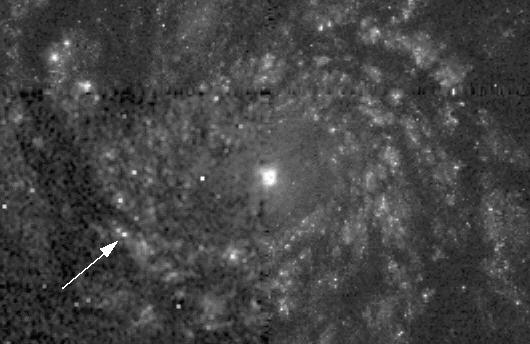Astronomy Picture of the Day
Discover the cosmos!
Each day a different image or photograph of our fascinating universe is
featured, along with a brief explanation written by a professional
astronomer.
April 21, 1996

A Supernova in the Whirlpool
Credit:
R. Kirshner (CfA),
NASA
Explanation:
In 1994, a new star in a distant galaxy
was seen by amateur
astronomers, who alerted the world to their discovery of a
supernova.
Near the nucleus of spiral galaxy M51,
popularly known as the Whirlpool,
this supernova (1994I) is identified as the bright spot indicated
by the arrow in the lower left of
this Hubble Space Telescope image.
Supernovae are violent death explosions of stars
that eject radioactive debri clouds.
They are often discovered by
amateur observers dedicated to systematic
searches of the sky and are of
intense interest to astronomers
who hope to learn what kind of stars generate these explosions
and what chemical elements are produced and mixed into space.
Distances to these
these intrinsically bright events can also be determined, providing
crucial yardsticks for measuring
the Scale of the Universe.
Tomorrow's picture: At the Edge of the Helix
| Archive
| Index
| Search
| Glossary
| Education
| About APOD |




Authors & editors:
Robert Nemiroff
(GMU) &
Jerry
Bonnell (USRA).
NASA Technical Rep.:
Sherri
Calvo.
Specific rights apply.
A service of:
LHEA
at
NASA/
GSFC




